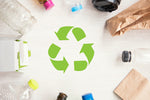
Are 'Chasing Arrows' Misleading for Ink Cartridges?
, by Planet Green, 3 min reading time

, by Planet Green, 3 min reading time
After half a century, the iconic 'chasing arrows' recycling symbol, a familiar sight on countless products, including ink cartridges, may be facing a significant transformation, according to a report by The New York Times.
While this symbol will continue to grace many recyclable items, the Environmental Protection Agency (EPA) is advocating for its retirement when it comes to plastics that pose recycling challenges.
But what's driving this change, and why is it important, especially in the context of recycling ink cartridges?
The Confusion Surrounding Recycling
In recent decades, plastic recycling has emerged as a pressing issue, and there is growing confusion about which plastics can and cannot be recycled.
Jennie Romer, a deputy assistant administrator at the EPA, was among those who penned an April letter to the Federal Trade Commission (FTC). Over 1,000 environmental groups also chimed in on this matter, highlighting the need for clarity.
In the EPA's letter to the FTC, Romer explained that consumers have long assumed that the presence of the 'chasing arrows' symbol implies an item is recyclable. However, this assumption doesn't hold true for many plastics, making the symbol potentially "deceptive or misleading."
You've likely noticed that within the recycling symbol on plastics, there is a number. This resin identification code indicates the type of plastic used, and only specific numbers are genuinely recyclable.
The EPA's request to the FTC is simple but profound: replace the standard symbol with a solid triangle on plastics that cannot be recycled. This change aims to alleviate confusion around labeling and prevent recycling facilities from being inundated with unprocessable plastics.

The Significance of Change
Why is this change so crucial, especially in the context of ink cartridges?
When non-recyclable plastics mix with recyclable materials, it contaminates the recycling stream. Additionally, these non-recyclable items must be sorted out and sent to landfills, leading to increased costs for recycling facilities.
Currently, the FTC defines a product as recyclable if at least 60% of the company's customers have access to recycling facilities that can process the item. The EPA suggests raising this threshold significantly, acknowledging that most plastic items are not genuinely recyclable.
The heart of the issue lies in the fact that the 'chasing arrows' symbol can't fulfill its intended purpose when a vast majority of plastic items end up as waste. In essence, misunderstanding and misuse of the symbol contribute to the plastic waste crisis facing our planet.
To put things into perspective, approximately 40 million tons of plastic are discarded in the United States each year. A 2022 Greenpeace study revealed that only about 5% of this plastic was recycled in 2021, a stark decrease from nearly 10% in 2014.
The crisis was further exacerbated when China stopped accepting millions of tons of plastic waste from the U.S. in 2018, leaving the country grappling with how to manage its plastic waste effectively.
Gary Anderson, the designer of the 'chasing arrows' logo in 1970, acknowledged the need for change, saying, "I do see their point. It was meant to be an overarching symbol to say, 'Hey, this is recycled, this has been recycled, or it's something you can recycle.' That's what it was supposed to be."
As consumers, as we contemplate the future of recycling symbols, particularly for items like ink cartridges, it becomes evident that reevaluating their use is not only necessary but vital for addressing the growing challenges in plastic recycling and reducing the environmental impact of our waste.

When people talk about e-waste, the conversation usually centers on big-ticket items: cell phones, laptops, televisions, or kitchen appliances. But one of the most common...

Most people see a printer cartridge as a small, everyday item. But behind that small piece of plastic is a surprisingly large environmental cost. Every...

The phrase “circular economy” has become a buzzword in sustainability circles, but what does it really mean? In simple terms, it’s about designing products and...

For years, recycling ink cartridges often meant relying on office collection bins, retail drop-off points, or corporate programs tied to large accounts. But as more...